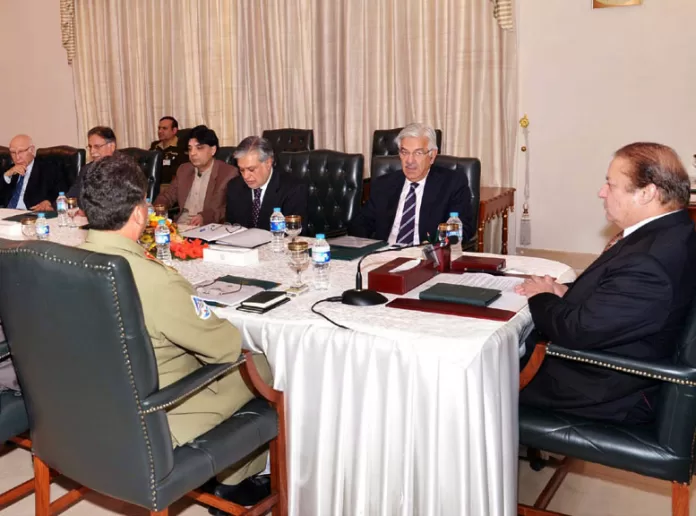
Following the Taliban’s announcement for a month long ceasefire, the government has reciprocated by suspending air strikes while retaining the option to respond to violent attacks. These developments came while speculations about a major ground offensive against the militants lodged in North Waziristan formed the most popular narrative. Now the government and the TTP have resumed the stalled peace process. However, the ceasefire has to be effective for creating a sustainable negotiation friendly environment. Given the loose and shaky structures of the TTP, enforcement of total cessation of militancy may not be forthcoming right on the onset hence there may be many ruptures before an enduring ceasefire comes into effect. As a consequence, the TTP-government parleys may be a tedious affair—akin to one step forward and two backwards. However, it is satisfying that government appears to have reconciled to the basic reality that there are no quick fixes when it comes to internal security and enormous patience and perseverance will be required.
Proposals have been floated for exchange of prisoners as part of confidence-building measures. However, it will be premature to contemplate over such a proposition until essential contours of a robust agreement have been worked out. There is a version that: “The surgical strikes have really put immense pressure on the TTP,” however, it would be an oversimplification to buy this notion. Likewise it is too early to draw any conclusions about the prospects of the peace deal. “The announcement of a ceasefire by the TTP is a positive step; it shows that the group is apparently serious in pursuing peace talks.
Earlier, the federal cabinet had unanimously approved the long awaited National Internal Security Policy (NISP). This document has a special focus on eliminating all terrorist networks through a combination of measures. Policy calls for a reassessment of governance and policy deficiencies that have resulted in the exploitation of vulnerable segments of society by militant groups. On the heels of announcement of this policy, dependents of missing persons arrived in Islamabad. They had braved extreme weather and walked for five months covering nearly 2000 km to reach the capital in an effort to know the whereabouts of their near and dear ones. Their chantings were fatigue ridden yet full of resolve. They were peaceful and hopeful that those adoring the capital will redress their grievances. The issue of missing persons is one of the core fallouts of acts of extremism-terrorism conjoint.
The domain of internal security cannot be established in a vacuum, it is linked to the overall national security paradigm especially in Pakistan, it is poised to take care of at least as many external determinants as it wishes to tackle on the domestic canvass. While the NISP does talk of past flawed policies on Afghanistan, India and Kashmir the text appears to assume that the past has been buried and that all institutions and individuals now understand and accept what went wrong and are determined not to repeat the same mistakes.

Moreover, Pakistan’s flawed US policy is another important contributor towards the internal mess in which we find ourselves embroiled in. Coinciding with the recent week-long round of Strategic Dialogue in Washington, Christina Fair gave her version of Pakistan-US relations in her article “Ten Fictions that Pakistani Defence Officials love to Peddle”; the text highlights the horrible perceptional dichotomies of the bilateral relations Christina Fair is known for her inconsistent, biased and erratic analyses however her article presents a dossier of how influential circles in the US think about Pakistan. There is also a widening gap between Pakistan government’s policy about the US and public aspirations about this. Unless Pak-US relationship is revisited to make it in line with public aspirations, even the best internal security policy may achieve only limited objectives.
To counter terrorism and extremism, new policy stipulates a coordinated approach at Federal, Provincial and District levels under the supervision of Counter-Terrorism Authority. It calls for enhancing the capacity of civilian law enforcement agencies with an effective check on terror financing, protecting assets, and improving the judicial system and anti-terror laws. The policy focuses on enhancing the capacity of civilian law enforcement agencies. Police will be the first line of defence and it will be given proper attention in terms of capacity enhancement. Other shortfalls are lack of forensic capability, protection of witnesses and judges and rudimentary investigation skills. However, primary weakness stems out of politicisation of the police service—with no immediate remedy in sight. Policy envisages that all 26 intelligence agencies of the country will coordinate and work in tandem under NACTA—again easier said than done.
Moreover, policy proposes an urgent study of country’s education sector to evaluate its role in development of an extremist mindset and focuses on reversing this trend. Interestingly, the seminary system has not been singled out for reforms, rather the entire system, including curriculum, textbooks and schoolteachers, will come under scrutiny. If implemented properly, this step will help in halting the process of harmful indoctrination of the youth. Policy acknowledges that cleavages in society provide a facilitating environment for terrorists to create sympathisers and recruits. To offset this trend, district-level extracurricular activities are planned to allow dialogue between children of all strata of society. Policy also focuses on plugging terrorist financing through creation of counter-terrorist financing units at the provincial level and ensuring implementation of the anti-money laundering laws.
Attempts to restore the dormant National Counter-Terrorism Authority (NACTA) to its rightful place of a policy coordinating body, that it was envisaged to be, is a welcome step. Policy incorporates formation of 500-strong rapid response teams to counter terrorism for Islamabad and the provinces. While such teams are needed in the aftermath of terrorist attacks, the fact remains that they will not do much to solve the problem of terrorism, since they are poised to be reactive.
While policy implementation would take its due course, it is necessary to keep a track of immediate events. At tactical level it is essential to capitalise on intra-Taliban differences. Such differences have come to fore, yet once again, through killing of Asmatullah Shaheen and his companions. The finger of suspicion has been pointed at his bitter rival Said Khan alias Sajna. Fissures within the Taliban ranks have now assumed a bloody posture. Two factions are likely to continue eroding each other. These rifts may have very serious consequences than all other factors. These divisions, if appropriately capitalised upon by the government, could provide an opening to strengthen the supporters of peace from within Taliban structures.
One expects that once put into practice, the new policy would strengthen deterrence, sending a clear message that the government is committed to crush terrorists and their affiliates. However, success in this complex war would largely depend on whether we can defeat the militant narrative as well. Failure to build a strong counterterrorism narrative has given a huge advantage to the Taliban and their allies. It is essential to defeat the extremist ideology through an appealing counter narrative. The business of persuading people to change their minds about how they see militancy is a tedious affair and this could indeed prove to be the biggest challenge we face. It is encouraging that during the national provincial and local bodies’ elections of 2013, voter turnout in terrorism hit zones was very high. There is a need to build on this silver lining.
While the debate would continue between the hawks and doves the cease fire by the Taliban has indeed thrown up an interesting opportunity in the context of our internal security and the government has acted prudently by responding positively.




